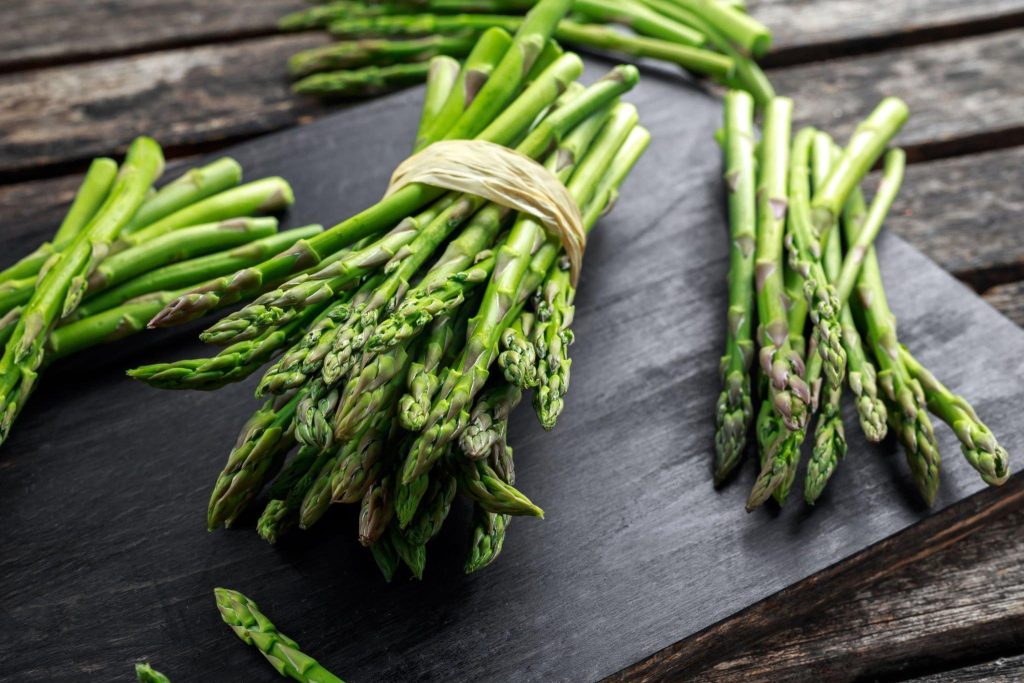Can Frenchies Eat Asparagus? – All You Need To Know
French Bulldogs, with their distinct bat-like ears and playful personalities, have captured the hearts of dog lovers worldwide. As a Frenchie parent, understanding their unique dietary needs is crucial for their well-being. While we often share our human foods with these adorable companions, it’s essential to pause and consider: what’s safe and what’s not? This brings us to a common query among Frenchie owners – can French Bulldogs eat asparagus?
Navigating the do’s and don’ts of your Frenchie’s diet can be a challenge, especially with so many human foods teetering between healthy and harmful. Asparagus, a nutrient-packed vegetable, often surfaces in this debate. In this article, we dive into whether asparagus is a suitable addition to your French Bulldog’s diet, ensuring you’re equipped with all the necessary info to keep your furry friend both happy and healthy.
Nutritional Benefits of Asparagus for Dogs

Asparagus isn’t just a tasty vegetable for humans; it’s also packed with nutrients that can be beneficial for dogs. This green veggie is a powerhouse of vitamins, including Vitamins A, B, and C. Vitamin A is great for your dog’s vision, immune system, and skin health. B vitamins help in energy metabolism, and Vitamin C is known for its antioxidant properties, keeping your Frenchie’s immune system strong.
But that’s not all. Asparagus is also rich in dietary fiber, which is essential for healthy digestion in dogs. A well-functioning digestive system is key to ensuring your Frenchie absorbs all the nutrients they need from their food. Plus, this vegetable has low-fat content, making it an excellent snack choice for dogs on a diet or those needing to manage their weight.
Moreover, asparagus provides a good supply of potassium, which is vital for healthy heart and muscle function. It’s a wholesome addition that supports your dog’s overall well-being. However, moderation is key. While asparagus offers these benefits, it’s important to introduce any new food slowly into your dog’s diet to monitor how they react to it.
Is Asparagus Safe for French Bulldogs?
When it comes to feeding your Frenchie asparagus, the big question is: Is it safe? The short answer is yes, but with a few important caveats. Asparagus poses no toxic threats to French Bulldogs, making it a generally safe choice. However, as with any human food, there are certain things to keep in mind.
Firstly, the size and texture of asparagus can be challenging for Frenchies. Their small mouths and unique jaw structure mean that large, hard pieces could be a choking hazard or cause difficulty in chewing. It’s best to cut asparagus into small, bite-sized pieces to make it easier and safer for them to eat.
Another aspect to consider is how asparagus is prepared. Raw asparagus can be quite tough and hard to digest for these little dogs. Cooking asparagus softens it, making it gentler on your Frenchie’s digestive system. But remember, when cooking asparagus for your dog, avoid adding any harmful ingredients like salt, garlic, onions, or heavy oils – simplicity is key.
Finally, while asparagus is safe, every dog is an individual. Some French Bulldogs might have sensitive stomachs or react differently to new foods. When introducing asparagus, start with small amounts to see how your dog reacts. If you notice any signs of gastrointestinal upset or other adverse reactions, it’s best to consult your vet.
Potential Risks of Feeding Asparagus to French Bulldogs
Even though asparagus is safe for your Frenchie in general, there are some risks to consider before making it a regular snack. Being aware of these can help you ensure your pup enjoys their greens safely and happily.
One of the primary concerns with asparagus is its tough, fibrous texture, especially when it’s raw. This can be hard for Frenchies to chew and digest. If the pieces are too big or too tough, there’s a risk of choking or gastrointestinal blockages. These issues are particularly important to watch out for in smaller breeds like French Bulldogs.
Asparagus also contains a compound called asparagine, which is a natural diuretic. While this isn’t harmful in small amounts, it can cause more frequent urination. For some dogs, especially those with kidney issues or young puppies still perfecting their house-training, this could be a problem.
Lastly, like any new food, asparagus can sometimes lead to an upset stomach, diarrhea, or gas in dogs. This is more about how an individual dog’s system reacts to new foods rather than a problem with asparagus itself. Every dog is different, so it’s important to introduce asparagus slowly and keep an eye out for any signs of digestive discomfort.
How to Safely Introduce Asparagus into Your Frenchie’s Diet
Introducing asparagus to your French Bulldog’s diet should be done gradually and with care. Here are some simple, effective steps to ensure that this new veggie addition benefits your pup without any problems.
Start Small
Begin by offering your Frenchie a small piece of cooked asparagus. Cooking it not only softens the tough fibers, making it easier to digest, but also helps enhance its natural sweetness, which might be more appealing to your dog. Keep the initial portions tiny to see how your dog reacts, both in terms of taste and digestion.
Monitor Their Reaction
After feeding asparagus to your Frenchie, keep an eye on them for any signs of gastrointestinal upset, like vomiting, diarrhea, or excessive gas. It’s also important to notice if they actually like asparagus. Not all dogs are enthusiastic about every vegetable, and that’s okay!
Increase Gradually
If your Frenchie enjoys asparagus and doesn’t show any adverse reactions, you can slowly start to increase the amount you give them. But remember, asparagus should only be a treat, not a major part of their diet. Treats in general, even healthy ones, should make up no more than 10% of a dog’s daily food intake.
Consistent Preparation
To keep things safe and easy for your dog, always prepare asparagus the same way before serving – cooked and unseasoned is best. This consistency helps your dog’s digestive system handle the new food more easily. Avoid any added oils, spices, or seasonings, which can be harmful to dogs.
When to Consult Your Veterinarian
Knowing when to get advice from your veterinarian is crucial in maintaining your French Bulldog’s health, especially when you’re adding something new to their diet like asparagus or its alternatives. Here are key scenarios where it’s best to consult with your vet:
Unexpected Reactions
If your Frenchie shows any signs of allergic reactions, like excessive itching, swelling, or difficulty breathing after eating asparagus, it’s time to call the vet. Similarly, any signs of digestive upset, such as vomiting, diarrhea, or loss of appetite, should be a prompt to seek professional advice.
Pre-existing Health Conditions
If your dog has existing health issues, particularly related to digestion or kidney function, talk to your vet before introducing asparagus or any new food. Your vet can provide guidance tailored to your dog’s specific health needs.
Dietary Changes and Balance
Even for healthy dogs, it’s a good idea to discuss dietary changes with your vet. They can offer advice on how to balance your Frenchie’s diet, ensuring they get all the nutrients they need. This is particularly important for foods that are safe but not typically part of a canine diet.
Regular Check-ups
Regular check-ups are the perfect time to talk about your dog’s diet, including any new foods you’re considering. Your vet can give the green light or suggest other options based on your dog’s health, age, and activity level.
Remember, your veterinarian is your partner in your Frenchie’s health. They can provide personalized advice and peace of mind, ensuring your dog’s diet is both safe and nutritious.
Frequently Asked Questions (FAQs)
1. How much asparagus can I safely feed my French Bulldog?
Moderation is key when feeding asparagus to your French Bulldog. Start with small pieces, about one or two bite-sized chunks, to see how your dog reacts. Treats like asparagus should only make up about 10% of your Frenchie’s daily food intake.
2. Can French Bulldogs eat asparagus raw or should it always be cooked?
Cooking asparagus is recommended for French Bulldogs. Raw asparagus can be tough and difficult for them to chew and digest. Cooked asparagus is softer and easier for them to eat, just ensure it’s plain and not cooked with any harmful additives.
3. Are there any side effects of feeding asparagus to my Frenchie?
In some dogs, asparagus might cause minor side effects like gas or changes in urination due to its natural diuretic properties. If you notice any digestive upset or allergic reactions, it’s best to stop feeding asparagus and consult your vet.
4. Can puppies eat asparagus too, or is it just for adult dogs?
Puppies can eat asparagus, but it should be introduced into their diet even more cautiously. Puppies have delicate digestive systems, so start with a very small amount after they are accustomed to solid foods and watch how they react.
5. What should I do if my Frenchie doesn’t like asparagus?
Not all dogs like the taste or texture of asparagus, and that’s perfectly fine. There are many other dog-safe vegetables that you can try, such as carrots, green beans, or pumpkin. Always introduce new foods slowly and watch for any adverse reactions.
Conclusion
In wrapping up, feeding your French Bulldog asparagus can be a healthy and enjoyable change in their diet when done properly. Remember, the key is to start with small, cooked portions and observe how your Frenchie reacts.
Moreover, always keep your vet in the loop about any major dietary changes, including introducing asparagus or other new foods. Every Frenchie is unique, and what works for one may not suit another, especially if there are underlying health concerns.
Regular check-ins with your vet will help tailor your dog’s diet to their specific needs, keeping them at their wagging best. By being mindful of these guidelines, you ensure that your French Bulldog not only enjoys their meals but also reaps the maximum health benefits from a well-rounded diet.







